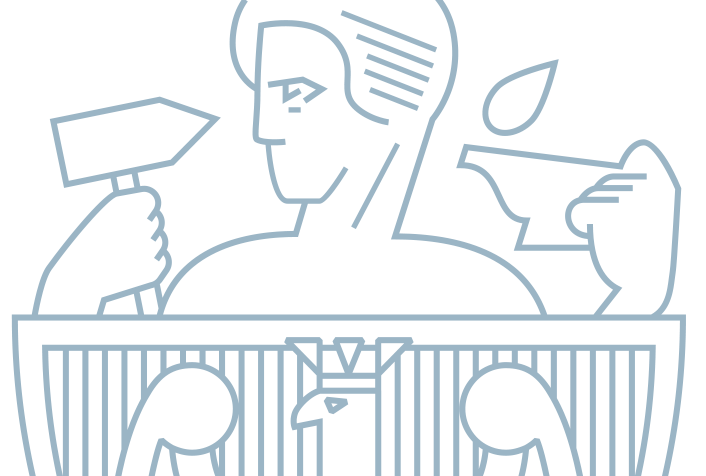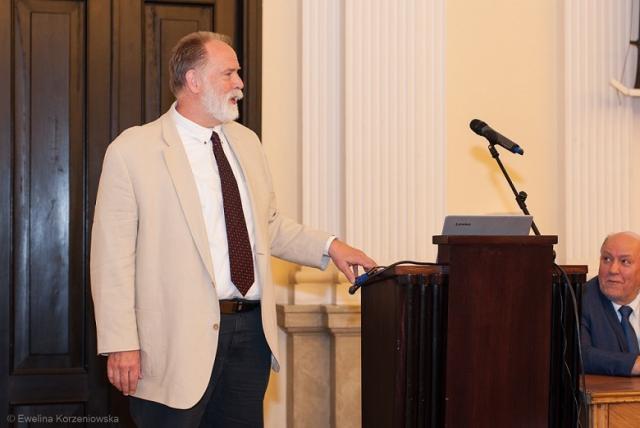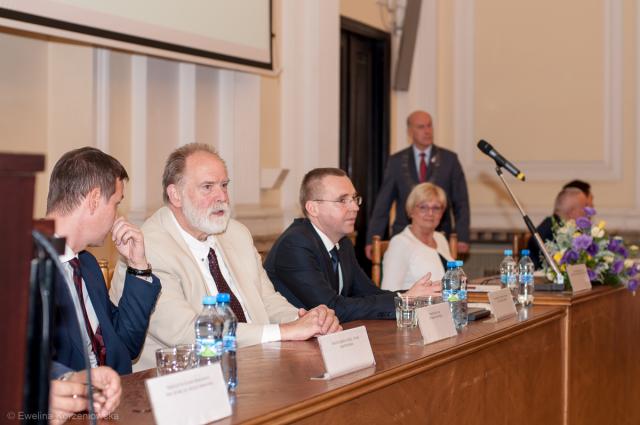Zachęcać do przekraczania własnych granic
- Jeśli ludzie nie próbują przekraczać granic własnych możliwości, nie dowiedzą się, jakie te możliwości są - mówi George Stuart Nezlek, profesor wizytujący w Politechnice Warszawskiej.
Profesor George Stuart Nezlek ukończył studia MBA z Informatycznych Systemów Zarządzania na Uniwersytecie DePaul w Chicago. Doktorat (Doctor of Philosophy) obroniony na Uniwersytecie Wisconsin-Milwaukee dotyczył architektury komputerowych obliczeń rozproszonych - podejścia opartego na wiedzy (Architectures for Cooperative Computing: a Knowledge-Based Approach).
Profesor prowadził wykłady i zajęcia praktyczne z pogranicza technologii informatycznych i zarządzania (Informatyczne Systemy Zarządzania, Zarządzanie Technologiami Informatycznymi, Analizę Systemową, Projektowanie Baz Danych), m.in. na: Lubar School of Business (University of Wisconsin - Milwaukee), Cameron School of Business (University of North Carolina Wilmington), School of Computing and Information Systems (Grand Valley State University, Allendale), School of Business Administration (Loyola University Chicago).
Laureat nagród za otwartość na studentów „Outstanding Teaching Award” w School of Business Administration oraz Mundelein College of Loyola University.
W roku akademickim 2017/2018 profesor George Stuart Nezlek prowadzi wykłady na Wydziale Zarządzania oraz na Wydziale Matematyki i Nauki Informacyjnych Politechniki Warszawskiej.
Rozmowę publikujemy w oryginale.
What were you surprised by during your first working days at Warsaw University of Technology?
There are many things about WUT that are certainly different in comparison to the Universities in the USA where I had taught for the past 30 years. That doesn’t mean better, or worse, it just means different. One thing that stands out as a surprise is the relative lack of standardization of actual teaching technologies available in classrooms. I have to point out that I have undoubtedly been the beneficiary of teaching in relatively new facilities in the USA. On average, the facilities in which I taught in the USA were typically less than five years old when I began teaching at the schools in question, and never more than ten years old. I was very fortunate. There was certainly an adjustment needed to adapt to the facilities at WUT, but professors should reasonably be expected to adapt to their environments, even if the focus of a course is on specific technologies. Another very pleasant surprise was the relative size of classes. Coming from an environment where mass lectures with 300 or more students in the class was common, the small class sizes at WUT are a welcome change. I have always believed that teaching is better when it is more personal. That is next to impossible with 300 students in one large lecture hall.
We know that you teach two courses in Warsaw University of Technology: System Analysis & Design and Introduction to Management Information System. Please explain us the most important challenges you find in your area of interest.
Getting students to be more active participants is probably the greatest challenge, and the language barrier is, to me, the greatest obstacle. Most of my students actually have very acceptable English language skills, definitely much better than my Polish skills - I am working on that. But most of my students often try to avoid public speaking and seem reluctant to risk making mistakes in the presence of their fellow students. Making mistakes is a necessary part of how people learn, and it is fine to make them as long as one does not make a habit of repeating them. Another challenge is that students may have had pre-requisite courses in Polish, and while the intellectual concepts may be the same, the comprehension does not always flow effortlessly across the language barrier. Finding examples that are relevant to a student’s prior coursework and experience can be a challenge, but for the most part my students have been wonderfully cooperative. Future versions of my courses will be designed with more requirements for students to use their presentation skills, since the English language component is one of the most important features of the courses I teach. ALL of us learn by doing.
Have you noticed any differences between proportions of theoretical and practical university courses in USA and Poland?
I will need to spend a bit more time more fully exploring the issue, and gain a bit more actual experience here, before I can give anyone a really well-formulated opinion. A first impression is that there is a good mix of abstract theory and practical, experience-based application in the curriculum. My students also seem to be employed in relevant professional situations, which greatly helps. It is much easier to explain many topics in the context of their ultimate practical and professional application, and when students have meaningful professional experience, that makes the task even easier.
Could you tell us something about your American and Polish students and their involvement in education? Their plans for the future? Are there any similarities?
The similarities are far greater than the differences, and from what I have been able to observe, the ultimate aspirations of students, once we take into account the incidental cultural end environmental factors, are pretty much the same. But, if I had to pick ONE characteristic that differentiated my Polish students from their American counterparts, I would say it was the double-edged sword of respect for faculty. I say double-edged because, while I welcome and greatly appreciate the typical conduct of my Polish students, I have a distinct awareness that Polish students are reluctant to challenge their professors. Some American students, and it is a growing problem at many institutions in the USA, unfortunately equate challenging the status quo of a body of knowledge with challenging the legitimacy of a professor’s authority, and this is very worrisome. However, not all challenges result from disrespect, and we need to encourage students to realize that respectfully challenging existing wisdom and conventions is the basis of making genuine progress. If existing wisdom is valid, it will readily survive the challenge. There is absolutely nothing wrong with students demanding the best from their professors, since we should always demand the best from them.
What type of good educational/scientific practices would you export from USA to Poland? And vice-versa?
So far, my experience is that the essence of good practice is similar across both environments. Professors need to engage their students in exploring issues beyond what may appear in the texts and other materials they assign for students. Our students are intelligent, capable adults. Our job is to go beyond the basics - to find their capabilities and ultimately ask them to try to achieve their full potential. Sometimes that means pushing them, as well as pushing ourselves, but if people never try to exceed their capabilities, they won’t really know what those capabilities are. One educational practice I would import? Ultimately, the performance and professional conduct of our students is the most important item on our curriculum vitae.
The last question: we’ve heard that your son is an NBA player…
Oh, if only that were true! My son is a very talented basketball player, but a serious injury brought his career to a halt and he is currently pursuing his Master’s Degree in Kinesiology instead. Like most of us he will earn a living by using his brain rather than a set of athletic skills. He did, however, get to play for a few years at the highest levels, and it was always fun to watch him on national television broadcasts on ESPN. Equally important to his professor father, he did make the all-conference academic honors team in his final year.
Zdjęcia: Ewelina Korzeniowska



